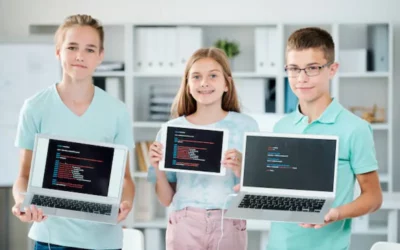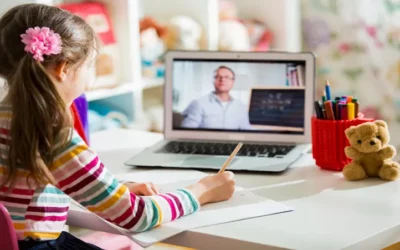In today’s digital age, understanding and utilizing coding skills have become increasingly important. As technology continues to shape our world, it is crucial to equip the younger generation with the knowledge and tools necessary to thrive in the digital landscape. Online coding courses for kids have emerged as an effective way to introduce children to the fundamentals of coding and programming in a fun and engaging manner. This article explores the benefits of online coding classes for kids, highlights key considerations for choosing the right course, and discusses how these courses can empower young minds to become future innovators.
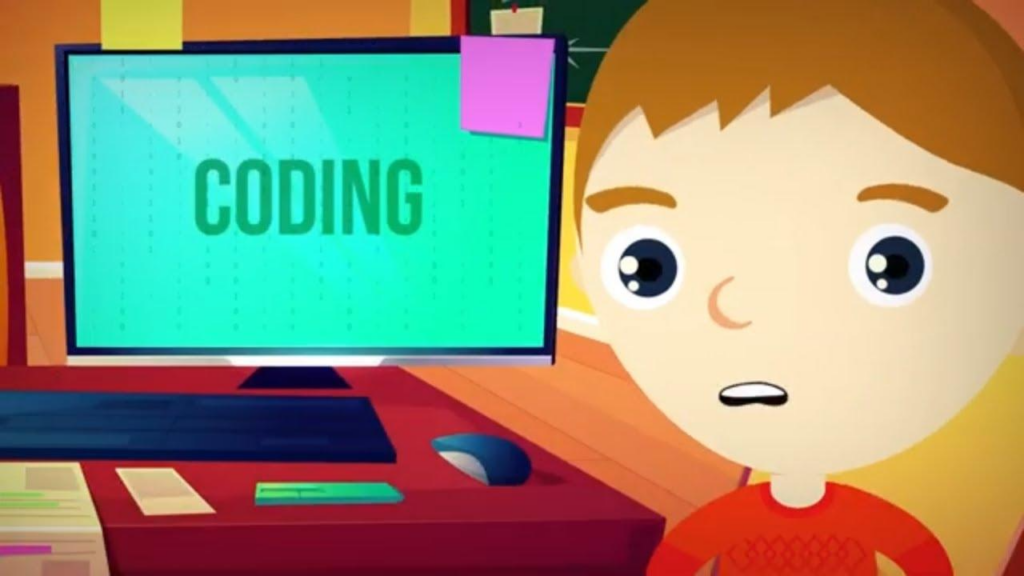
Table of contents
- The Importance of Coding Courses for Kids
- Benefits of Online Coding Courses for Kids
- Choosing the Right Online Coding Course
- Popular Online Coding Platforms for Kids
- Key Features to Look for in Online Coding Courses
- Programming Languages for Kids
- Gamification and Project-Based Learning
- Building a Strong Foundation for Future Opportunities
- Overcoming Challenges in Online Coding Courses for Kids
- Encouraging Creativity and Problem-Solving Skills
- Collaborative Learning and Peer Interaction
- Creating a Supportive Learning Environment
- Progress Tracking and Certifications
- Parental Involvement and Support
- Inspiring Success Stories: Real-Life Examples of Young Coders
- Conclusion
- Frequently Asked Questions (FAQs)
The Importance of Coding Courses for Kids
Coding skills have become increasingly essential for personal and professional success. It is never too early to start learning how to code, and coding courses for kids offer numerous benefits. Here are some reasons why coding courses are crucial for kids:
- Develop problem-solving skills: Coding requires critical thinking and problem-solving abilities. When kids learn to code, they develop logical and analytical thinking, enabling them to solve complex problems both inside and outside the classroom.
- Enhance creativity: Coding empowers kids to utilize their creativity to design and develop their own projects. They can create computer games, animations, and websites, which not only boosts their confidence but also encourages them to think outside the box.
- Prepare for future careers: In today’s job market, coding skills are in high demand. By learning to code at an early age, kids can prepare for future careers in fields such as software development, robotics, and artificial intelligence.
- Improve math skills: Coding involves a lot of math, and learning to code can help kids enhance their math skills. They can learn concepts such as algorithms, geometry, and data analysis, which can help them excel in math class.
- Foster teamwork: Many coding courses for kids involve group projects, enabling them to learn how to work collaboratively with others. This is an important skill that can be applied to various areas of life, including school, sports, and future careers.
Know more about coding for kids.
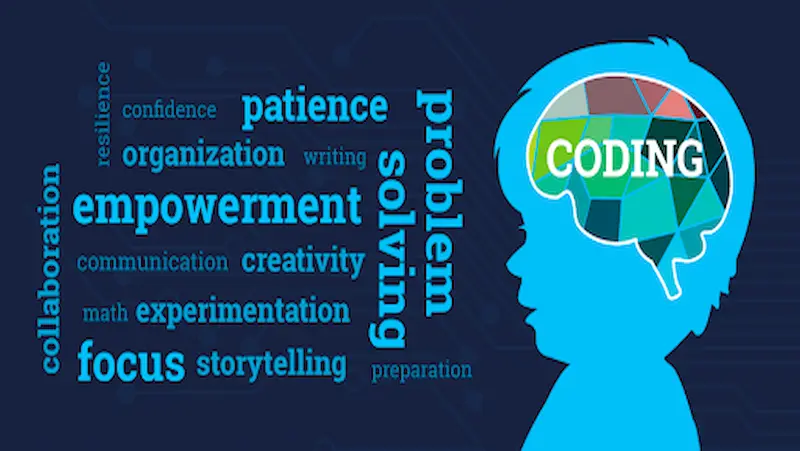
Benefits of Online Coding Courses for Kids
Online coding courses offer numerous benefits for young learners.
- Firstly, they foster critical thinking and analytical skills, encouraging kids to break down complex problems into manageable parts.
- Secondly, these courses promote creativity by allowing children to design and develop their projects, fostering a sense of accomplishment and self-expression.
- Additionally, coding courses enhance computational thinking, helping kids develop a systematic approach to problem-solving that can be applied across various domains.
- Moreover, online coding courses for kids nurture perseverance and resilience, as coding often requires trial and error, pushing children to persist and find solutions.
Choosing the Right Online Coding Course
When choosing the right coding course for your child, several factors should be considered to ensure a suitable and engaging learning experience. Here are six key factors to consider:
1. Age Appropriateness
Select a coding course that aligns with your child’s age and developmental stage. Courses designed specifically for their age group will provide content and teaching methods tailored to their learning needs and abilities.
2. Curriculum and Content
Evaluate the course curriculum to determine if it covers fundamental coding concepts and gradually progresses to more advanced topics. Look for courses that strike a balance between theory and hands-on coding projects to keep your child engaged.
3. Interactivity and Engagement
Consider courses that offer interactive and engaging learning experiences. Look for features like gamification, interactive coding exercises, and multimedia content that can capture your child’s interest and make the learning process enjoyable.
4. Teaching Methodology
Understand the teaching approach employed by the course provider. Determine if the course utilizes visual programming interfaces, block-based coding, or text-based coding, depending on your child’s skill level and preferences.
5. Support and Guidance
Ensure that the course provides adequate support and guidance to your child. This can include access to instructors, online forums, or communities where they can seek assistance and collaborate with fellow learners.
6. Reviews and Recommendations
Read reviews and seek recommendations from other parents or educational professionals who have experience with coding courses for kids. Their insights can help you make an informed decision based on the quality and effectiveness of the course.
By considering these factors, you can choose a coding course that matches your child’s age, learning style, and interests, creating an optimal environment for them to develop their coding skills and foster a lifelong passion for technology.

Popular Online Coding Platforms for Kids
Several academies and software platforms offer free online coding programs for kids. Here are a few worth exploring:
- CodeChamps by BrightCHAMPS:
- CodeChamps by BrightCHAMPS is an exceptional platform that introduces children to the captivating world of programming. Through a holistic curriculum, CodeChamps nurtures problem-solving abilities, creativity, and critical thinking skills. Passionate mentors guide young learners on an enchanting coding journey, unlocking their potential and shaping them into tech-savvy champions. BrightCHAMPS also offers other next-gen life skills such as Financial Literacy, Communication Skills, and Robotics, making it an excellent all-in-one learning space for kids.
- Code.org:
- Code.org is an online platform offering coding courses for kids from kindergarten to high school. Their interactive games and challenges introduce coding basics to children of all ages. Code.org provides free courses covering various programming languages such as JavaScript, Python, and HTML/CSS. The platform has partnered with reputable organizations like Google, ensuring a comprehensive learning experience. From puzzles to webpage development, Code.org offers a wide range of courses to cater to different interests and skill levels.
- Khan Academy:
- Khan Academy is a non-profit organization that offers a wide range of online courses, including coding courses for kids. The courses are self-paced, and children can learn at their own speed. The platform offers courses in JavaScript, HTML/CSS, and SQL, among others. Khan Academy is free to use, and all courses come with a comprehensive set of video tutorials and practice exercises. This Khan Academy provides varieties of online courses. This is especially for self-paced learning.
Key Features to Look for in Online Coding Courses
To maximize the learning experience, it is essential to choose online coding courses with certain key features. Look for courses that provide a user-friendly interface and intuitive coding platforms specifically designed for kids. These platforms often incorporate drag-and-drop functionality or visual programming languages that simplify the coding process. Interactive exercises and quizzes help reinforce learning, and progress tracking features enable parents and kids to monitor improvement. Furthermore, courses that offer community forums or peer interaction opportunities foster collaboration and support among young coders.
Programming Languages for Kids
Scratch
Scratch is a programming for kids language and an online community where children can create their interactive stories, games, and animations. It’s designed for children ages 8 to 16 and is an excellent place to start for beginners. Scratch uses a block-based coding system, making it easy for children to understand and use. Scratch coding for kids free has a vast library of resources, including tutorials, guides, and example projects. Scratch coding for kids is undoubtedly an excellent programming platform for your kids that can help them start on their amazing coding journey with ease!

Python
Python is a great programming language for kids to learn. It has a clear and simple syntax, making it easy for beginners to understand and write code. The beginner who is interested in starting raw coding can opt for Python always. Since the syntax of Python is almost the same as writing mathematical calculations in the English Language. Here are some resources and tips to help kids get started with Python:
Install Python: The first step is to install Python on your computer. You can download the latest version of Python from the official website. Make sure to choose the correct version for your operating system.
Online Resources: There are many free online resources available to learn Python. Some popular coding websites for kids are Edublocks(block-based Python learning platform), Codecademy, Khan Academy, and Python for Kids.
Books: There are many great books available to learn Python. Some good ones for kids include “Python for Kids: A Playful Introduction to Programming” by Jason R. Briggs and “Teach Your Kids to Code: A Parent-Friendly Guide to Python Programming” by Bryson Payne.

JavaScript
JavaScript is a popular programming language used for creating interactive websites, games, and other web applications. It’s a great language for kids to learn because it’s easy to get started with and can be used to create fun and interactive projects. The platforms which provide JavaScript technology are code.org, scratch, and thinkable as well.
HTML and CSS
HTML and CSS are two foundational languages used to create websites and web pages. They’re a great place to start for kids who are interested in web development. HTML is very easy for everyone those who want to learn the concepts of web development.
This is the foundational course and this is the basic level for almost all the computer coding for kids courses. Even though HTML doesn’t come under any programming courses, these are one of the most used languages around the world. This is considered to be the foundational course for Front-End development.

Gamification and Project-Based Learning
Gamification is a powerful technique used in online coding courses to engage and motivate young learners. By integrating game elements like levels, badges, and rewards, these courses make the learning journey exciting and enjoyable. Project-based learning is another effective approach where kids work on real-world coding projects, applying their knowledge to solve practical challenges. This hands-on experience fosters creativity, critical thinking, and problem-solving skills while allowing children to showcase their creations to a wider audience.
Building a Strong Foundation for Future Opportunities
Online coding courses for kids lay the groundwork for future opportunities in the digital world. As technology continues to advance, coding skills will become increasingly valuable across various industries. By starting early and developing a solid foundation in coding, children gain a competitive edge and open doors to exciting career prospects in fields such as software development, artificial intelligence, and robotics.
Overcoming Challenges in Online Coding Courses for Kids
While online coding courses offer immense benefits, certain challenges may arise. Kids may encounter frustration when debugging their code or tackling complex concepts. Patience and persistence are key in overcoming these challenges. Encourage children to seek help and provide guidance when needed. Creating a positive and supportive learning environment can significantly enhance their coding journey.
Encouraging Creativity and Problem-Solving Skills
Online coding courses empower kids to think outside the box and unleash their creativity. Through coding, children can bring their ideas to life, creating interactive stories, games, and apps. This process nurtures their problem-solving skills as they encounter challenges and find innovative solutions. By experimenting with different coding concepts, kids learn to approach problems from various angles, fostering a flexible and adaptable mindset.

Collaborative Learning and Peer Interaction
Online coding courses for kids serve as a gateway to the digital world, equipping young minds with essential skills for the future. These courses offer a fun, interactive, and engaging learning environment where children can explore the wonders of coding. Despite its individualistic nature, coding often involves working on complex projects that require a collective effort. Collaboration allows programmers to leverage diverse perspectives, share knowledge, and combine strengths to create robust solutions.
Collaborating with others fosters open communication, idea exchange, and problem-solving discussions. It enhances creativity, expands learning opportunities, and helps overcome individual limitations. Moreover, teamwork improves code quality through peer code reviews and ensures smoother project management.
By embracing the social aspect of coding, programmers can cultivate a supportive and inclusive environment, build strong professional networks, and create remarkable software through the synergy of collaborative efforts.
Creating a Supportive Learning Environment
To create a supportive learning environment for kids taking online coding courses, establish a dedicated workspace with a reliable computer or tablet and a comfortable chair. Minimize distractions and ensure a stable internet connection to avoid interruptions during coding sessions. Encourage regular breaks and physical activities to maintain focus and prevent fatigue.
Progress Tracking and Certifications
Progress tracking is an essential feature in online coding courses. It allows parents and kids to monitor their advancement and identify areas that require additional attention. Celebrate milestones and achievements to motivate your child along the coding journey. Some courses offer certifications upon completion, which can be valuable for showcasing coding skills to potential schools or employers.
Parental Involvement and Support
The role of parents in supporting and nurturing their child’s coding passion is vital. Here are key aspects to consider:
- Encouragement: Provide consistent support and encouragement, acknowledging their efforts and progress in coding. Celebrate their achievements and show interest in their projects.
- Resources and Opportunities: Offer access to coding resources, books, online tutorials, and coding camps or workshops. Provide them with opportunities to apply their skills through real-world projects or by participating in coding competitions.
- Collaboration and Mentorship: Facilitate opportunities for your child to collaborate with other young coders or connect with mentors in the field. Encourage them to join coding clubs, attend coding events, or engage with online coding communities.
- Balancing Screen Time: Help your child strike a balance between coding activities and other interests. Encourage physical activities, reading, and social interactions to foster a well-rounded lifestyle.
- Patience and Understanding: Understand that learning to code takes time and patience. Be patient with your child’s progress and challenges. Offer guidance and support when they face difficulties.
- Career Awareness: Educate your child about the diverse career opportunities in coding. Help them explore different paths within the field and understand the potential impact their coding skills can have in various industries.
By supporting and nurturing your child’s coding passion, you can foster their love for coding, provide them with the necessary resources, and help them develop the skills and mindset needed for a successful and fulfilling journey in the world of programming.
Inspiring Success Stories: Real-Life Examples of Young Coders
Throughout history, numerous young coders have achieved remarkable success. From creating groundbreaking applications to launching startups, their stories inspire and motivate young learners. Share these success stories with your child to demonstrate what is possible through coding, including code class for kids. We at BrightCHAMPS, encourage them to dream big and pursue their own coding aspirations. Here are some testimonials –
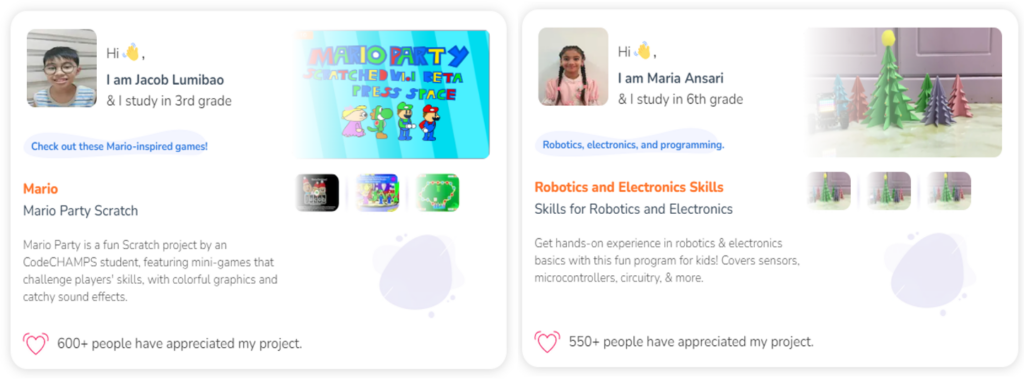
Conclusion
In conclusion, coding courses for kids offer a gateway to endless possibilities. By providing children with coding education, we equip them with essential skills for the future. From problem-solving and critical thinking to creativity and collaboration, coding fosters valuable abilities that extend beyond the digital realm.
There are an enormous amount of benefits of coding for kids. Mainly the improvement of logical skills, analytical skills, reasoning ability, and improved academic results. As parents and teachers, we have to encourage the kids for learning to code and to practice more in coding-related stuff.
This not only helps the kids as a skill but also increases their thinking ability as well. There are many coding courses available for kids of all ages and skill levels. Codechamps by Brightchamps is an exceptional coding program that empowers your kids with the power of coding skills and teaches them the fundamentals of coding from scratch. With experienced instructors, your kids get the chance to be mentored from the best!
To read more such educational resources to help in your kid’s growth and development, check out Brightchamps Blog Page now!
Frequently Asked Questions (FAQs)
Coding is the process of writing instructions that a computer can understand and execute. It involves using programming languages to create software, websites, coding apps for kids, and other digital products. Coding is an important skill for kids to learn because it not only provides them with a valuable skill set but also helps them develop problem-solving, logical thinking, and computational thinking skills that are essential for success in any field.
There is no approximate age for starting the coding. Kids as young as 6 years old can begin learning coding through age-appropriate courses and platforms. If the child is interested in learning the computers and willing to do activities on the computer then the child is all set to learn coding.
Generally, the programming languages that can be taught to kids are HTML and CSS, Scratch, Python, and JavaScript on code.org.
Learning coding at a young age can benefit your child’s future by developing critical thinking, problem-solving, and logical reasoning skills. It opens up opportunities in various STEM-related fields and nurtures a mindset of innovation and creativity.
The types of coding projects that kids can expect to work on during a coding course will depend on the specific curriculum and goals of the program. However, here are some examples of coding projects that are common for kids to work on:
I) Basic games: Kids may start by learning to code simple games, such as pong, space invaders, or a maze game.
II) Websites: Kids can learn to build simple websites using HTML, CSS, and JavaScript.
III) Mobile apps: With the help of block-based programming or other app-building tools, kids can learn to create mobile apps that can be run on smartphones or tablets.
Absolutely! Offline activities, such as coding books, coding toys, or attending coding camps and workshops, can complement online coding courses. These activities provide hands-on experiences and further reinforce coding concepts learned online.
While learning to code online through various resources can be a great way for kids to start coding, there are several benefits to enrolling them in a coding course that is not available through self-learning. The main features are structured learning, certification, and Mentors. These won’t be available on the self-paced learning.
Some organizations and institutions offer scholarships or grants for coding courses. Research local opportunities or check with coding education providers for potential financial aid.
Encourage your child to practice coding regularly, provide access to coding resources and tools, and engage in discussions about their coding projects to foster a supportive learning environment.


 We are an army of educators and passionate learners from BrightChamps family, committed to providing free learning resources to kids, parents & students.
We are an army of educators and passionate learners from BrightChamps family, committed to providing free learning resources to kids, parents & students.









